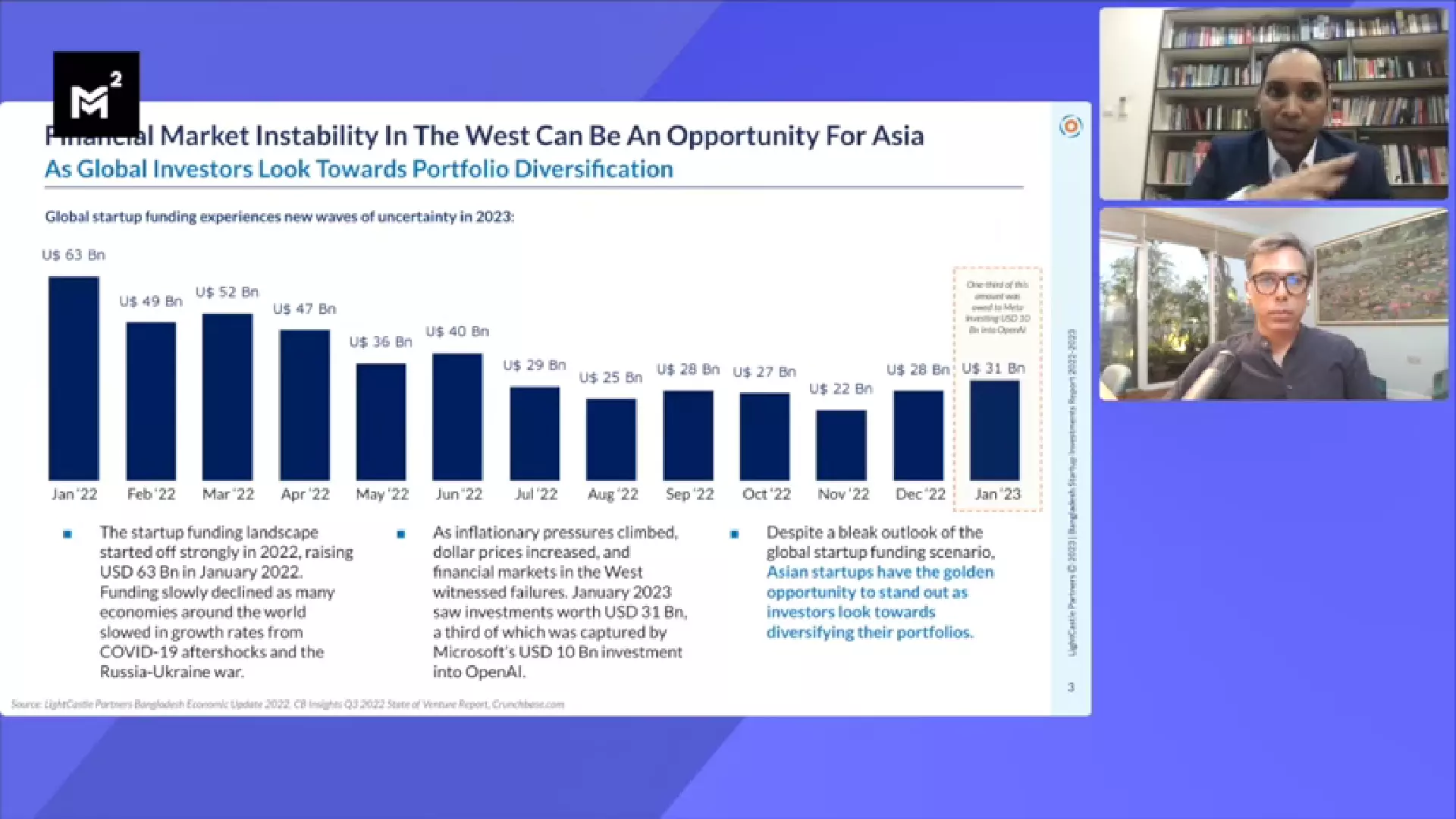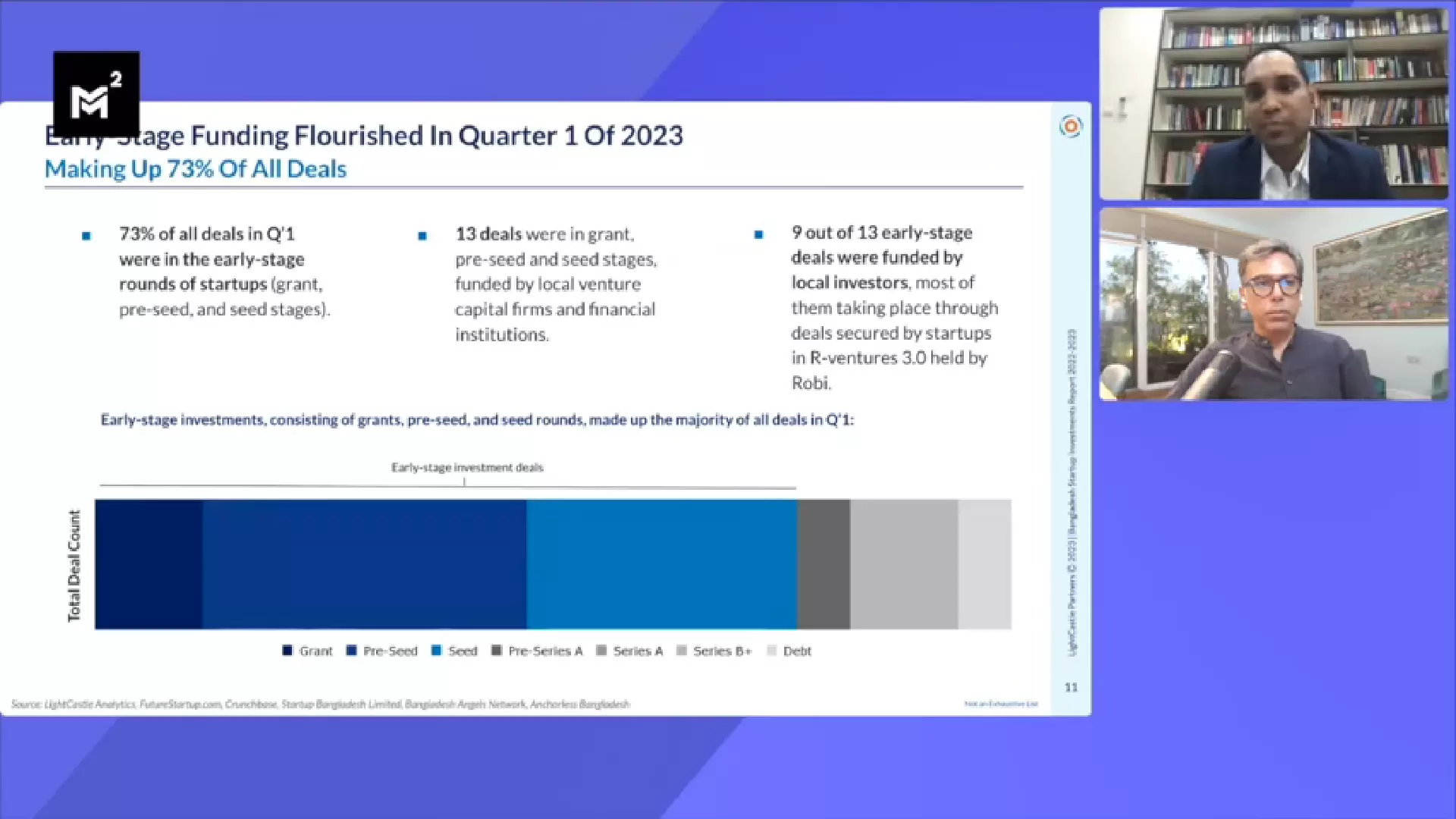GET IN TOUCH
- Please wait...

The Bangladesh Startup Investment Report, one LightCastle’s flagship publications published quarterly as well as in the form of a comprehensive year-end review, provides insights into the current state and emerging trends of the Bangladesh startup landscape.
Bijon Islam, CEO of LightCastle Partners, recently appeared on the Money Square podcast hosted by renowned investor and entrepreneur, Mustafizur Rahman Khan, to talk about the year-round Bangladesh startup investment trends and future projections as uncovered in the latest 2022 and Q’1 2023 editions of the Bangladesh Startup Investment Report.
Bangladesh’s start-up investment constitutes only 0.03% of its total GDP, a stark contrast to neighboring countries like Pakistan, where startup investment constitutes 0.1% of GDP. The disparity is even more noticeable when compared with larger economies like India (0.6%) and China (0.24%). Singapore stands out with an impressive 1.6% investment in start-ups, highlighting the substantial gap between Bangladesh and other countries in fostering a conducive start-up environment.
In recent quarters, the challenges faced by the Bangladesh startup ecosystem have been exacerbated by global market uncertainty caused by interest rate hikes, inflationary pressures, the Russia-Ukraine conflict, and economic slowdowns in the EU and the US.
Despite the challenges, Bangladesh has experienced an increase in the number of deals secured in the first quarter of 2023, indicating progress. While local investment in Bangladeshi startups has risen, they have not been adequate to fill the gap left by foreign investors.
The podcast delves into these disruptions, emphasizing their impact on the start-up landscape, and the opportunities hidden amidst the uncertainties, and painting a picture of the future trajectory.

When examining the macroeconomic fundamentals of Bangladesh, there are several promising factors. With a population of nearly 170 million, the country possesses a substantial middle-income market that is projected to reach 34 million by 2025, surpassing the total population of Malaysia. Additionally, the GDP per capita in Bangladesh exceeds that of India and Pakistan. Furthermore, the consumer market is anticipated to become the 9th largest globally.
In comparison, Pakistan outperforms Bangladesh in attracting FDI in startups due to a stronger international network and its inclusion in the MENA (Middle East and North Africa) region, which facilitates funding allocation. Despite both countries being part of South Asia, India’s thriving startup ecosystem often overshadows Bangladesh, resulting in diverted attention and resources. Moreover, Pakistan and India benefit from a larger pool of global fund managers, which isn’t the case for Bangladesh.
Insufficient focus on branding and lack of a dedicated mandate for promoting startup investment further hinder Bangladesh’s progress. Additionally, complex regulations and repatriation issues in Bangladesh present challenges for investors, while holding shares outside of Pakistan is comparatively easier.
Lastly, the noteworthy success stories of founders in Pakistan transitioning from being founders to becoming investors have played a crucial role in establishing the existence of companies and attracting investors, an aspect that Bangladesh could emulate.
Local corporates, second-generation RMG, and steel manufacturers are keen on diversifying their businesses and exploring new avenues for investment. In line with this, Bangladesh Bank has implemented regulations requiring banks to allocate a portion of their profits toward supporting startups. Additionally, IDLC has launched a venture capital initiative and has begun investing in local ventures.
In the transition from the last quarter of 2022 to the first quarter of 2023, startup funding in Bangladesh has witnessed noteworthy progress. The first quarter alone has recorded double the investment compared to the previous quarter, reflecting a positive growth trajectory.
Additionally, there has been a 1.5 times increase in the number of deals, holding a threshold of more than 10 deals per quarter, which is an encouraging sign of the ecosystem’s vitality.
Notably, early-stage investments have experienced a surge, emphasizing the significance of having more deals in the early stages to foster greater chances of success. Around 73% of deals have been invested in the early stage, while late-stage funding has also witnessed growth.
Moreover, there has been a remarkable increase in locally raised investments, which have surged seven-fold. This shift indicates a growing interest among local investors, fostering a healthier ecosystem and expanding the investment pipeline.
While global investment still constitutes 67% of the total investment, local investments have seen a significant rise to reach 33%. This trend marks a shift from the dominance of global investors in the past decade, as 95% of total deals were previously sourced globally.
In the first quarter of 2023, the concentration of capital in the startup sector reveals that financial services continue to dominate, followed by media and entertainment, as well as education and software industries. This distribution sets a positive tone for the year, with predictions suggesting that 2023 will be a decent year overall.
Investments are expected to rebound in 2024, providing opportunities for startups that can weather the storm and achieve positive unit economics to reap the benefits.
As the global recession subsides, there is a growing focus on impact investments in climate-sustainable companies. Moreover, with Bangladesh transitioning from a least developed country (LDC), the nature of grant funding is poised to change. Consequently, a significant number of investors are showing interest in Bangladesh for the first time.
Notably, new ventures led by Bangladeshis are emerging amidst the global recession, bringing back valuable knowledge and adopting holding company structures located outside of Bangladesh to raise capital and operate within the country.
In support of the startup ecosystem, the government has helped in benefiting the startup ecosystem through initiatives such as Startup Bangladesh Limited, a venture capital firm, which facilitated 18 deals in the last year and the ecosystem wants to create at least five unicorns by 2025.

The podcast concluded with an enlightening Q&A segment delving into topics such as how can founders effectively navigate the forthcoming year, insights on pre-seed funding, and the reduction in valuation in terms of deal pipelines.
Bijon Islam also shed light on emerging categories that have captured the attention of investors, as well as sectors that are currently experiencing a lack of significant investment. Finally, he discussed the case study of Bangladesh, highlighting why it hasn’t witnessed sufficient impact investment despite being a noteworthy hub for social business and impact investment.
To gain a deeper understanding of the emerging trends, opportunities, and challenges in the Bangladesh startup ecosystem, watch the full video of the podcast through the link below.
Our experts can help you solve your unique challenges